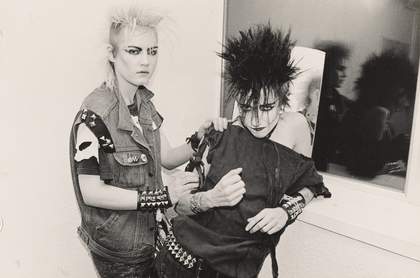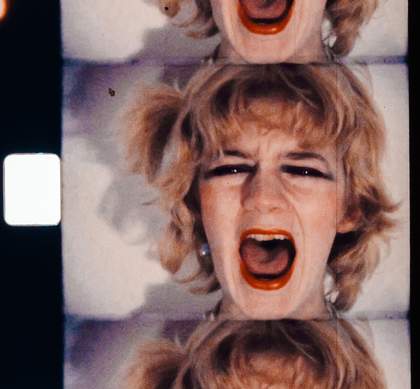The 1980s were a critical decade in the struggle for lesbian rights and visibility in Britain. Society’s attitudes towards lesbians and queer individuals were largely shaped by stigma and ignorance, and media representation of lesbians was largely absent or concentrated on the perpetuation of narrow stereotypes. Despite facing widespread prejudice and homophobic policies such as the passing of Section 28, the LGBTQ+ community found ways to create spaces for liberation and solidarity.
Featuring Women in Revolt! artists, this panel discussion takes their diverse bodies of work as a starting point to explore the nuanced ways in which art-making was used as a means of resistance and radical self-expression, fostered communities, and helped establish lesbian rights as part of the public discourse.
Moderated by Dr Maggie Matić, the event aims to explore the historical resonance of 1980s lesbian and queer art in Britain and how it continues to inform art and activism today.
Tate Britain's step-free entrance is on Atterbury Street. It has automatic sliding doors and there is a ramp down to the entrance with central handrails.
There is a lift between the Lower and Main floors. Alternatively you can take the stairs.
- Accessible, standard and Changing Places toilets are located on the Lower floor.
- Ear defenders can be borrowed from the ticket desk on the Lower floor.
To help plan your visit to Tate Britain, have a look at our visual story. It includes photographs and information about what you can expect from a visit to the gallery.
For more information before your visit:
- Email hello@tate.org.uk
- Call +44 (0)20 7887 8888 (daily 09.45–18.00)
Del Lagrace Volcano
Del LaGrace Volcano (they/them) (b. California 1957) is considered to be one of instigators of queer LGBTQI culture with a working practice that not only documents a ‘queer time and place’ but are also iconic testaments to the love, lust, and burning desire to defy the forces that seek to destroy, disrespect and deactivate us. They have been making work about the queer cultural moments they have both lived and been part of created for nearly 50 years. Volcano has produced five photographic monographs: Love Bites (1991), The Drag King Book with Jack Halberstam (1999), Sublime Mutations (2000), Sex Works with Paul (B)eatriz Preciado (2005) and Femmes of Power: Exploding Queer Femininities with Ulrika Dahl (2008). Their work has also been included in numerous exhibitions, books, journals and films, on art, gender, photography and the body for the past 40 years. They are currently artist in residence at Künstlerhaus Bethanian, Berlin.
Dr Maggie Matić
Dr Maggie Matić (they/them) is a curator, writer and researcher with a specialism in contemporary feminist, crip and queer theory and visual culture. Their doctoral thesis presented a cross-section of contemporary feminist culture through an examination of feminist art, zines and uses of social media, with a specific focus on the body as a site of resistance. Maggie is currently Programme Manager and Artist Development Curator at Somerset House Studios and is a trustee of The Feminist Library. They have previously worked at Studio Voltaire, Tate, FACT (Foundation for Art and Creative Technology), The University of Liverpool and The Royal Standard.
Rosy Martin
Rosy Martin (born London 1946) is an artist-photographer, psychological-therapist, workshop leader, lecturer and writer. She explores the relationships between photography, memory, identities and unconscious processes using self-portraiture, still life photography and video. From 1983, in collaboration with the late Jo Spence, she evolved and developed a new photographic practice - phototherapy - incorporating re-enactments. Through embodiment, they explored the psychic and social construction of identities within the drama of the everyday. Exhibiting internationally and publishing widely since 1985, she has investigated issues including gender, sexualities, ageing, class, location, shame, loss, grief and reparation. In ‘Transforming the suit: what does a lesbian look like?’ (1987) she played with different historical and contemporary stereotypes to challenge simplistic assumptions.
Poulomi Desai
Poulomi Desai is a multidisciplinary artist and curator. She is self-taught and for over 30 years, has been involved in performance, live art, sound and photography installations interrogating the politics of identity, listening and perception, inspired by her activist and DIY post punk background. Her work has been shown in institutions including Tate, Serpentine Galleries, Autograph ABP, Science Museum London, Habitat India and Baltic Gateshead. She co-founded Shakti, the first South Asian LGBTQ+ club and organisation, the NAZ HIV/AIDs project, and HAC - the punk art, Asian performance company in the 80s and runs the Usurp Art Charity, supporting outsider artists.


